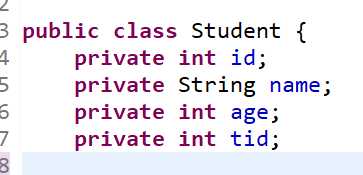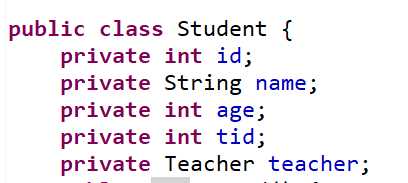mybatis多表查询
Posted zdl2234
tags:
篇首语:本文由小常识网(cha138.com)小编为大家整理,主要介绍了mybatis多表查询相关的知识,希望对你有一定的参考价值。
Mybatis实现多表查询有三种方式:
(需求:给一个实体类设置属性值,但该实体类的数据保存在数据库的两张表中)
1,分别对两张表进行查询,将获取到的数据分别赋值给实体类。
2,编写多表查询的sql语句,通过给查询到的数据设置与实体类相同的别名,使用Auto Mapping特性,将查询结果自动映射到实体类。
3,使用MyBatis的<resultMap>标签,程序员编写映射关系。
(注意这些方法可以用于多表查询,当然单表查询也可以)
下面介绍使用<resultMap>标签的方法:
1,需要映射的实体类中不包含对象时;

1.1 使用<resultMap>标签时,<select>标签不写 resultType 属性,而是使用 resultMap 属性引用<resultMap>标签,resultMap属性写<resultMap>标签的id属性值,表示引用该<resultMap>的映射关系。
1.2 <resultMap>标签中的每一个标签代表一个映射关系,<id>表示主键映射,<result>表示普通映射。
<?xml version="1.0" encoding="UTF-8"?> <!DOCTYPE mapper PUBLIC "-//mybatis.org//DTD Mapper 3.0//EN" "http://mybatis.org/dtd/mybatis-3-mapper.dtd"> <mapper namespace="com.bjsxt.mapper.StudentMapper"> <resultMap type="student" id="mymap"> <id column="id" property="id"/> <result column="name" property="name"/> <result column="age" property="age"/> <result column="tid" property="tid"/> </resultMap> <select id="selById" resultMap="mymap" parameterType="int"> select * from student where id = #0 </select> </mapper>
2,当映射的实体类中包含单个对象,使用<association>来映射一个对象


2.1当前sql查询不包含那个对象的属性,则需要调用别的查询方法来查询
<association>标签属性:
- (1) property: 对象在类中的属性名
- (2)select:调用哪个查询查询出这个对象的信息
- (3)将当前哪列的值作为参数传递给调用的查询语句
<?xml version="1.0" encoding="UTF-8"?> <!DOCTYPE mapper PUBLIC "-//mybatis.org//DTD Mapper 3.0//EN" "http://mybatis.org/dtd/mybatis-3-mapper.dtd"> <mapper namespace="com.bjsxt.mapper.StudentMapper"> <resultMap type="student" id="mymap"> <id column="id" property="id"/> <result column="name" property="name"/> <result column="age" property="age"/> <result column="tid" property="tid"/> <association property="teacher" select="com.bjsxt.mapper.TeacherMapper.selById" column="tid"></association> </resultMap> <select id="selById" resultMap="mymap" parameterType="int"> select * from student where id = #0 </select> </mapper>
2.2如果当前查询结果包含该对象的属性,则不需要调用别的查询方法
<association>标签属性:
(1) 此时把<association/>看成小的<resultMap>看待
(2)javaType 属性:<association/>专配完后返回一个什么类型的对象.取值是一个类(或类的别名)
<?xml version="1.0" encoding="UTF-8"?> <!DOCTYPE mapper PUBLIC "-//mybatis.org//DTD Mapper 3.0//EN" "http://mybatis.org/dtd/mybatis-3-mapper.dtd"> <mapper namespace="com.bjsxt.mapper.StudentMapper"> <resultMap type="student" id="mymap"> <id column="id" property="id"/> <result column="name" property="name"/> <result column="age" property="age"/> <result column="tid" property="tid"/> <association property="teacher" javaType="Teacher" > <id column="tid" property="id"/> <result column="tname" property="name"/> </association> </resultMap> <select id="selById" resultMap="mymap" parameterType="int"> select s.id sid,s.name sname,age age,t.id tid,t.name tname FROM student s left outer join teacher t on s.tid=t.id where s.id = #0 </select> </mapper>
3,当要映射的实体类中包含一个集合对象,使用<collection>标签对集合进行映射。

3.1当前查询不包含集合数据,调用其他方法进行查询集合的数据
<resultMap type="teacher" id="mymap"> <id column="id" property="id"/> <result column="name" property="name"/> <collection property="list" select="com.bjsxt.mapper.StudentMapper.selByTid" column="id"></collection> </resultMap> <select id="selAll" resultMap="mymap"> select * from teacher </select>
3.2当前查询已经包含集合的数据,不需要调用其他方法查询
属性:ofType与javaType相似,表示该标签配置完返回一个什么类型的对象。
<resultMap type="teacher" id="mymap1"> <id column="tid" property="id"/> <result column="tname" property="name"/> <collection property="list" ofType="student" > <id column="sid" property="id"/> <result column="sname" property="name"/> <result column="age" property="age"/> <result column="tid" property="tid"/> </collection> </resultMap> <select id="selAll1" resultMap="mymap1"> select t.id tid,t.name tname,s.id sid,s.name sname,age,tid from teacher t LEFT JOIN student s on t.id=s.tid; </select>
注意:在上面的代码中查询结果包含多个Student,则肯定创建了多个student对象,那teacher会不会也被创建了多个呢?其实不会的,虽然查询的结果确实每一条数据都会包含teacher的数据,但是每条的teacher的id属性都是一样的,MyBatis相同的id值只会创建一个对象。
Auto Mapping 也可对对象进行映射
1,将查到的属性名改为 `teacher.id`的形式,Mybatis就会去寻找teacher对象的id属性进行映射。
<select id="selAll" resultType="student"> select t.id `teacher.id`,t.name `teacher.name`,s.id id,s.name name,age,tid from student s LEFT JOIN teacher t on t.id=s.tid </select>
以上是关于mybatis多表查询的主要内容,如果未能解决你的问题,请参考以下文章